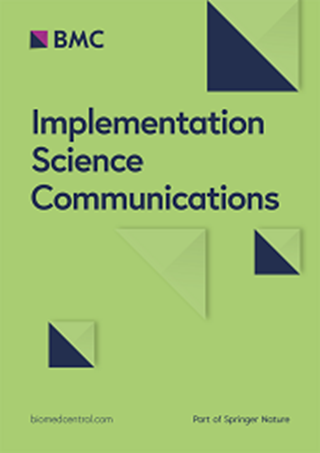通过整合筛查和治疗服务加快消除宫颈癌(ACCESS 研究)实施战略的比较效果:尼日利亚分组随机混合 III 型试验方案
IF 8.8
1区 医学
Q1 HEALTH CARE SCIENCES & SERVICES
引用次数: 0
摘要
尽管感染艾滋病毒的妇女(WLHIV)罹患宫颈癌(CC)的风险增加,但非洲的宫颈癌筛查和治疗(CCST)率仍然很低。将宫颈癌筛查和治疗服务纳入非洲既有的艾滋病项目可改善宫颈癌的预防和控制。然而,由于缺乏有效实施策略(IS)的证据,限制了许多国家整合工作的成功。在本研究中,我们试图找出有效的实施策略,以加强将 CCST 服务纳入尼日利亚现有的艾滋病项目。我们建议的研究在探索、准备、实施和维持(EPIS)框架的四个阶段开展形成性和实验性活动。在探索阶段,我们通过与利益相关者共同绘制实施图,确定了一套核心 IS(核心)和一套增强型 IS(核心+),其中大部分选自《实施变革的专家建议》。在准备阶段,我们与实施资源团队一起改进和调整了核心和核心+ IS,使之适合当地情况。在实施阶段,我们将进行分组随机混合 III 型试验,以评估 Core 与 Core+ 的比较效果。艾滋病毒综合治疗点(k = 12)将按地区进行匹配,并按地区分层,以 1:1 的比例随机分配到 Core 或 Core+。在持续阶段,我们将评估每个治疗点持续开展 CCST 的情况。研究结果将采用 RE-AIM 进行评估:覆盖率(筛查率)、采用率(研究机构对 IS 的接受程度)、IS 忠实度(IS 按照协议进行的程度)、临床干预忠实度(按照协议提供 CC 筛查、现场治疗和转诊)、临床效果(治疗后筛查阴性)和持续性(持续提供 CCST 综合服务)。此外,我们还将对潜在机制进行描述性探索,包括组织准备、实施氛围、CCST 自我效能和实施意图。对提高 CCST 使用率的信息系统进行评估符合到 2030 年消除 CC 这一公共卫生威胁的全球计划。我们的研究将为低收入环境确定一套循证IS,以便将循证CCST干预措施纳入常规艾滋病护理中,从而改善WLHIV的健康状况和预期寿命。该研究于 2023 年 11 月 7 日在 ClinicalTrials.gov 进行了前瞻性注册,注册号为 NCT06128304。NCT06128304. https://classic.clinicaltrials.gov/ct2/show/study/NCT06128304本文章由计算机程序翻译,如有差异,请以英文原文为准。
Comparative effectiveness of implementation strategies for Accelerating Cervical Cancer Elimination through the integration of Screen-and-treat Services (ACCESS study): protocol for a cluster randomized hybrid type III trial in Nigeria
Despite the increased risk of cervical cancer (CC) among women living with HIV (WLHIV), CC screening and treatment (CCST) rates remain low in Africa. The integration of CCST services into established HIV programs in Africa can improve CC prevention and control. However, the paucity of evidence on effective implementation strategies (IS) has limited the success of integration in many countries. In this study, we seek to identify effective IS to enhance the integration of CCST services into existing HIV programs in Nigeria. Our proposed study has formative and experimental activities across the four phases of the Exploration, Preparation, Implementation, and Sustainment (EPIS) framework. Through an implementation mapping conducted with stakeholders in the exploration phase, we identified a core package of IS (Core) and an enhanced package of IS (Core+) mostly selected from the Expert Recommendations for Implementing Change. In the preparation phase, we refined and tailored the Core and Core+ IS with the implementation resource teams for local appropriateness. In the implementation phase, we will conduct a cluster-randomized hybrid type III trial to assess the comparative effectiveness of Core versus Core+. HIV comprehensive treatment sites (k = 12) will be matched by region and randomized to Core or Core+ in the ratio of 1:1 stratified by region. In the sustainment phase, we will assess the sustainment of CCST at each site. The study outcomes will be assessed using RE-AIM: reach (screening rate), adoption (uptake of IS by study sites), IS fidelity (degree to which the IS occurred according to protocol), clinical intervention fidelity (delivery of CC screening, onsite treatment, and referral according to protocol), clinical effectiveness (posttreatment screen negative), and sustainment (continued integrated CCST service delivery). Additionally, we will descriptively explore potential mechanisms, including organizational readiness, implementation climate, CCST self-efficacy, and implementation intentions. The assessment of IS to increase CCST rates is consistent with the global plan of eliminating CC as a public health threat by 2030. Our study will identify a set of evidence-based IS for low-income settings to integrate evidence-based CCST interventions into routine HIV care in order to improve the health and life expectancy of WLHIV. Prospectively registered on November 7, 2023, at ClinicalTrials.gov no. NCT06128304. https://classic.clinicaltrials.gov/ct2/show/study/NCT06128304
求助全文
通过发布文献求助,成功后即可免费获取论文全文。
去求助
来源期刊

Implementation Science
医学-卫生保健
CiteScore
14.30
自引率
11.10%
发文量
78
审稿时长
4-8 weeks
期刊介绍:
Implementation Science is a leading journal committed to disseminating evidence on methods for integrating research findings into routine healthcare practice and policy. It offers a multidisciplinary platform for studying implementation strategies, encompassing their development, outcomes, economics, processes, and associated factors. The journal prioritizes rigorous studies and innovative, theory-based approaches, covering implementation science across various healthcare services and settings.
 求助内容:
求助内容: 应助结果提醒方式:
应助结果提醒方式:


